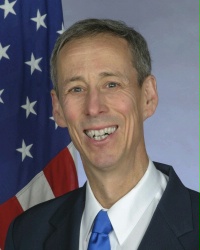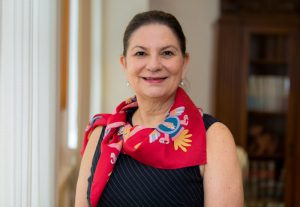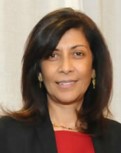CalChamber Participates in National Virtual Trade Gathering
(October 13, 2020) The California Chamber of Commerce recently joined 125 trade specialists from across the nation for virtual sessions hosted by the National Association of District Export Council’s (NADEC) Annual Export Symposium. In previous years, attendance has been in person in Washington, D.C., but this year’s format was moved online as to not miss any important trade happenings in the world during COVID-19.
Susanne Stirling, CalChamber vice president of international affairs, and Nicole Ellis, International Assistant were among participants at the virtual October 8 Symposium. Stirling serves on the Northern California DEC and following seven years on the NADEC Board representing the Pacific NW region – will continue as an Associate member for a one-year term. For more info on the CalChamber and the California DECs visit our DEC page here.

The symposium was opened by Oz Erdem, outgoing 2019-2020 chair of the National DEC. Erdem formally handed over the NADEC chairmanship to Shawn Levsen for 2020-2021. Mr. Levsen represents the Texas Camino Real DEC from UPS and is a licensed customs broker and international business professor at Austin Community College.
The first portion of the day emphasized DEC engagement. The first panel was moderated by Jonathan Szucs, General Manager of Advanced Superabrasives Inc., and featured Monica Barber, Partner at Barber International Law Group LLC and CalChamber’s Susanne Stirling. The panel discussed new methods of keeping DEC members engaged during COVID-19 and the era of remote work.

Next was one of two featured panels of the day, the first discussed workarounds for operating in key challenged markets. This panel was moderated by David Day, President of Global Risk Mitigation Foundation. Mr. Day is an international lawyer, Chairman of the American Bar Association’s Belt and Road Task Force, s a member of the Hawaii DEC, and co-chair of the NADEC’s Trade Policy Committee. The panel featured John Saylor, Director of the International Trade Group for Commonwealth Trading Partners. Mr. Saylor’s expertise is on Vietnam where his firm has an office. Ambassador (Ret.) Craig Allen, President of the U.S. China Business Council also served on the panel with his expertise in China having served as the former Deputy Assistant Secretary of Commerce for China and U.S. Senior Commercial Officer in Beijing. Ambassador Allen is also a member of the NADEC’s Advisory Committee. The panel was rounded out by Stacy Standley, Joint Managing Director of Sikand-Standley-India. Mr. Standley has run his own company conducting business between the U.S. and India for decades. His firm is based in New Delhi and Las Vegas, where he also serves as the Director of the Nevada DEC.
This panel was designed to focus on the reality of working in challenged markets and to develop understanding of the exact roadblocks within each of these markets. The “workarounds” that have been developed by business experts provide practical solutions to such challenges. The key challenged markets the group discussed were China, Vietnam, and India – as China is the only major market which will grow this year, and India and Vietnam both will be major sources of growth in the global economy over the next decade.

Ambassador Allen provided good advice when entering China’s market: to seek out tariff exemptions when possible, use the local US Commercial Service to get an accurate view, and to test the market by entering Taiwan or Hong Kong first.
Mr. Saylor emphasized how Vietnam is the U.S.’s 10th largest trading partner despite being a country of only 90 million people. It also was noted that Vietnam is the 4th largest trading partner for the Ports of Los Angeles and Long Beach. Japan has provided incentive to companies who are relocating out of China with Vietnam and India likely destinations.
Mr. Standley commented how many of these Japanese businesses are in the automotive sector and may look to India to re-locate to as the Indian automotive sector is one of the fastest growing sectors. The importance of using the US Commercial Service operations on the ground in the partner country along with local contacts was highlighted by all. Finding the right local partner and location is key, as many times the native citizen will have more connection to and knowledge of the local network. For example, in India it is important to know where to enter the market: New Delhi is the government capital, Mumbai is the financial capital, Hyderabad is a medical technology center, Bangalore is the IT center, and Chennai is an automotive hub.

The second featured panel was titled the USMCA and Mexico Towards the Creation of an Integrated Trade Zone in the Americas. Ernesto Pinal, Director of International Business Alliances at Maximage Data Systems moderated the group. Mr. Pinal is an advocate for export promotion, having had experience growing exports in several different companies. He is currently one of two elected representatives for the Pacific NW to the NADEC. The panel featured Ambassador Martha Barcena Coqui, Ambassador of Mexico to the U.S. Ambassador Barcena has served as Ambassador of Mexico to several countries including Turkey, Azerbaijan, as well as Denmark and Norway. The next guest was Dr. Sergio Silva, Head of Economic Intelligence United of the Ministry of Economy. Finally, Dr. Eduardo Solis of MSquare Consultations was also a participant on the panel. Dr. Solis is an expert on supply management operations and served as the President of the Mexican Association of the Automotive Industry from 2008 to January 2020. Dr. Solis also was responsible for the negotiations of the agricultural chapter of NAFTA and Mexico’s free trade agreements (FTAs) with its Latin American neighbors while serving at the Mexico’s Ministry of Economy.
This panel focused on the phrase “thinking globally while acting locally”. The discussion introduced a unique perspective on leveraging the implementation of the new USMCA with existing FTAs to create diversified regional business strategies that are more local and less vulnerable to geographical and geopolitical challenges. The end goal was to promote de-centralized business strategies within the Americas.
The panel members noted that Canada and Mexico are the destination for over 70% of United States exports, but that the importance of the USMCA is that it’s economic integration provides a platform to produce for a global market, not only the North American economies. It was pointed out that Mexico has FTAs with the EU and TPP, which gives access to those areas as well. Focus was also put on Latin America as whole. Latin America makes up 34% of the world’s GDP, but only has 13% of the world’s population. In addition, there is a new initiative in Mexico proposed by President Obrador which will help connect North and South America by building a 200-mile-long railroad and highway at the thinnest part of Mexico to connect the Atlantic and the Pacific Oceans. This will provide a less time-consuming alternative to the over-crowded Panama Canal. Current wait time for Canal transit can be 10 days, with a 10 hour transport time – compared to 6 hours by rail. This potential roadway and rail could play a key role in the world’s supply chains and for the USMCA.
The final panel of the day was on pivoting supply chain strategy in a COVID-19 world moderated by Rudy Ortiz, Manager of Client Services of the Arkansas Economic Development Commission. The panel featured Robert Martichenko, CEO of LeanCor Supply Chain Group and Bindiya Vakil, CEO and co-founder of Resilinc.
The panel discussed how COVID-19 supply chain disruptions have been unprecedented and still remain. Companies are investing in becoming more operationally efficient, as they must know where parts are coming from along every step of the process as they reassess supply chains, risk and resilience. Ms. Vakil laid out how this translates for companies which are now looking at near-shoring or re-shoring, looking at adding inventory and building warehouses, adding a second-source or site to add resilience to the sourcing network, and looking at the reality that all of these value propositions are very expensive. However, a less expensive alternative, Ms. Vikal, notes is for companies to operate in the supply chain with data driven programs and proper risk management.

The keynote speaker for the virtual event was Kusum Kavia, co-founder and president of Combustion Associates, Inc (CAI) in California’s Inland Empire. Mrs. Kavia shared her inspiring journey to building her successful international company after immigrating to the United States from Kenya via London. Mrs. Kavia and her husband co-founded the company which has provided custom-engineered solutions to clients in the energy, process and environmental industries for over 25 years. CAI has created a global presence, building equipment in California and shipping the parts around the globe which are currently powering projects in the U.S, Canada, the Middle East, and countries in Africa and Asia. Mrs. Kavia spoke specifically of CAI’s power plant project in Benin. CAI bid for the project from the Government of Benin and was chosen because of their proposal to use local labor and create jobs, provide training on how to operate the power plant and help the country’s economic development. Mrs. Kavia emphasized the importance the U.S. Department of Commerce played in helping to facilitate this project, by introducing resources available at home and abroad, including the Export-Import Bank of the U.S. Mrs. Kavia also mentioned how important her fellow DEC member’s support and mentoring was during each step along the way.

The event wrapped up with final comments from the new chair of the National DEC, Shawn Levsen, with hopes for an in-person DEC conference sometime in the near future to continue developing U.S. exports.
Export Councils
The District Export Councils (DEC) contribute leadership and international trade expertise to complement the U.S. Commercial Service’s export promotion efforts through counseling businesses on the exporting process and conducting trade education and community outreach.
The DEC members are appointed by the Secretary of Commerce. These international trade professionals use their knowledge and international business experience to act as consultants to small and medium sized businesses who want to export their products into markets outside of the United States.
For more than 40 years, DECs have served the United States by assisting companies in their local communities export, thus promoting our country’s economic growth and creating new and higher-paying jobs for their communities.
The National Association of District Export Councils and the 60 District Export Councils throughout the United States are composed of over 1,500 international business executives and trade experts with extensive business, government and academic experience in trade. The mission of these councils is to work with the U.S. Commerce Department on export promotion and commercial diplomacy.
Synopsis prepared by Nikki Ellis.
